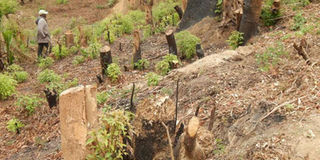Think outside the box on forest security

This image taken on February 28, 2018 in Wundanyi Forest, Taita Taveta County, shows the effects of logging. We need urgent security measures to protect our water catchment areas and increase forest cover. PHOTO | LUCY MKANYIKA | NATION MEDIA GROUP
What you need to know:
- There is a need for a professional security risk assessment to identify the reasons for illegal deforestation.
- We need an alternative source of energy to replace firewood and charcoal.
- The public should be sensitised about forests as national heritage and how they contribute to our survival.
The wanton destruction of Kenya’s forests has been in the limelight following shocking footages of massive illegal logging and encroachments in the media.
Unfortunately, the destruction is due to greed, poverty and lack of strategic planning.
But now, there is hope for the survival of our forests following the intervention from the top leadership of the country.
We need urgent security measures to protect our water towers and increase forest cover.
There is a need for a professional security risk assessment to identify the reasons for illegal deforestation.
SOLUTION
It appears, however, that we are rushing for quick-fix solutions.
Haphazard measures are doomed to fail, leading to waste of money and resources.
Many suggestions have been fronted, including installation of gadgets such as CCTV cameras.
But any security expert will tell you that forests don’t require such complex measurers.
There are three main types of illegal destruction of forests.
CHARCOAL
The first is the peasant-oriented illegal collection of firewood and charcoal burning.
Due to increased population and poverty, people have encroached on forests.
This is a serious challenge since any prohibition of the activities is likely to be met with stiff resistance by peasants.
We need an alternative source of energy to replace firewood and charcoal.
Mauritania, a very poor North African country, has heavily subsidised gas prices for the poor, leading to very few people using charcoal.
AGRICULTURE
The second mode of destruction is encroachment on forest reserves for farming — which is a very difficult challenge since it is highly politicised.
Most of our water catchment areas are slowly collapsing and streams disappearing. National parks and reserves are in danger.
This requires both security measures and political approaches. The third is illegal logging by timber harvesters.
All the above are very easy to identify since they are openly visible.
Anyone overflying Ngong, Cherangani Hills, Nandi Hills, Chyulu Hills, Mt Kenya, Aberdare and other forests will notice the wanton destruction going on there.
This brings into question those entrusted with the security of the forests — the Kenya Forest Service (KFS).
INFORMANTS
To improve the effectiveness of the KFS, we need to recruit the right people and equip them with the necessary tools.
And we must do serious background checks on the recruits, especially on integrity.
Many illegal loggers improvise informal routes using tractors and donkeys to ferry timber.
But this can only succeed if they involve the residents.
There is, therefore, a need to recruit local informants to provide first-hand information on illegal timber harvesting.
A CCTV camera will not be effective here — unless you litter the entire forest with the gadgets, which is not practical considering the cost factor.
SURVEILLANCE
Vehicle movement inside the forests should be strictly monitored through a uniform access control system.
This may not require an electronic access control system but simple hard print booking since vehicular traffic in forest areas is usually low.
The Kenya Forest Service can also seek special assistance from the National Police Service, Kenya Wildlife Service and even the military in the form of random helicopter surveillance over forests to detect massive destruction. They can also use drones.
The last approach is public sensitisation about forests as national heritage and how they contribute to our survival.
With these simple measures, our forests can be well secured. There is, therefore, no need for costly high-tech gadgets that could be difficult to maintain.
Mr Mbarak is chairman, Association of Corporate and Industrial Security Management Professionals (ACISMP) [email protected]





